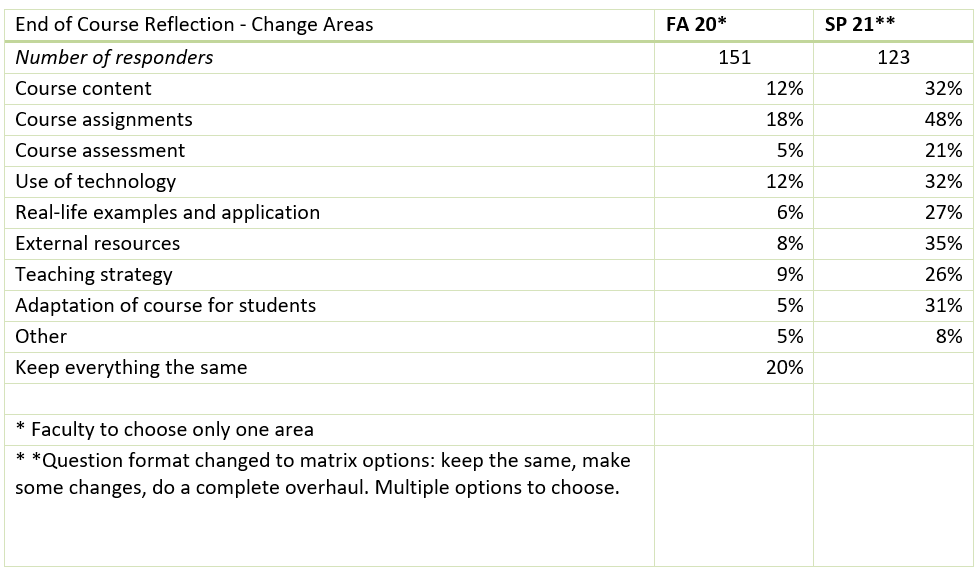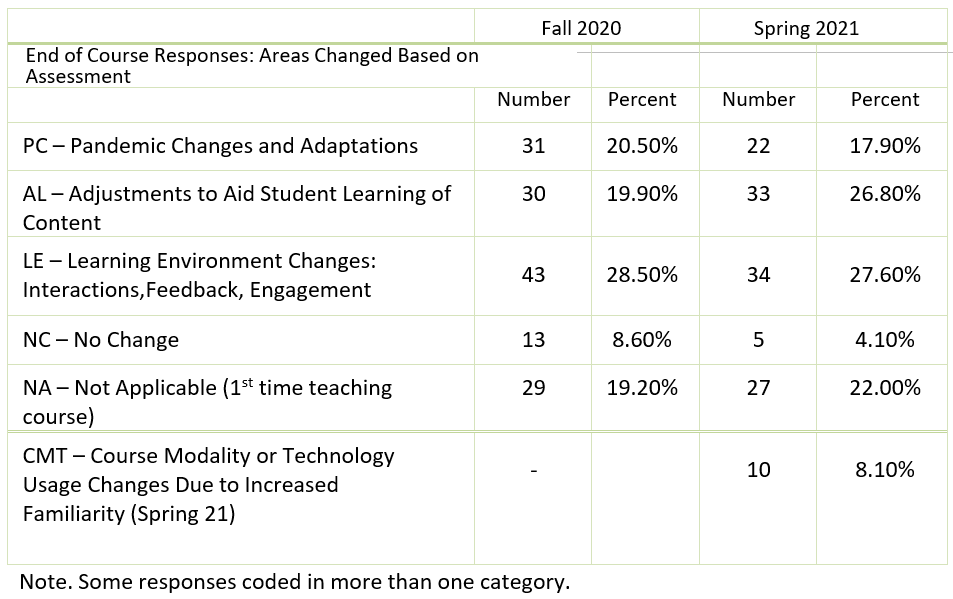Most educational practices continued during the academic year 2020-2021 despite the restrictions caused by the Covid-19 pandemic. While faculty certainly had to pivot and replace in-person modality with a virtual reality, this switch to virtual did not fully define the educational improvement at the course level at Georgian Court University (GCU). This statement is collaborated with evidence from my institution’s End of Course (EOC) Reflection questionnaire. Changes to teaching and learning at the course level continued to be guided not just by the pandemic changes in modality but also by previous assessments and the use of critical reflection to support continuous improvement of teaching and learning, one course, one faculty at a time.
The End of Course (EOC) Reflection is a practice adopted by my university for course assessment. (See GCU Assessment Plan for Student Learning (netdna-ssl.com).) Each semester, faculty are asked to choose one current course that they are likely to teach again. The reflection survey guides them through various questions related to what they would like to keep, change, or delete in their course the next time they teach it. Course instructors are next guided to reflect on inclusion of practices related to the university’s core values, and how these are evidenced in the classroom. Lastly, faculty completing the questionnaire are asked to relate how they used previous assessment to institute any changes in the presentation, content, or teaching of the course in the current term. It is this last question that bears further analysis. What did you change this term based on the previous course assessment? The responses to changes based on assessment went beyond pre-pandemic areas of course assignments, course content or adjustments in course material to practices related to the learning environment and adjustments made to assist students in interactive learning within the virtual modality forced by pandemic restrictions. The faculty had switched modalities to online learning mid-way through the previous semester (Spring 2020).
The assessment practice of reflection on praxis has its basis with Dewey (1938) who suggested the need for an approach to inquiry for the development of critical perspective and was later developed by Stephen Brookfield (2017) as a basis for higher education and adult learning. Critical reflection’s alignment with assessment is acknowledged by Wall, Hursch, and Rodgers (2014) “assessment as a component of being a reflective professional operating in the complex, messy, modern environment of higher education” (p.7). This practice gives purpose to assessment and ties it to teaching and learning rather than to governmental or accreditation required statistics.
Using critical reflection to assess the results of teaching one course per semester has allowed faculty at Georgian Court University to concentrate either on developing one course over time or to develop a teaching technique over several assigned classes. Faculty analyze one course in depth rather than do a cursory report on multiple courses. In the fall 2020 and spring 2021 semesters about one- third of the respondents stated that they had taught the selected course more than six terms. A high return rate on the reflection survey shows the value departments and faculty place on this regular assessment practice. In Fall 2020, 80 out of 90 full-time instructors responded to the survey (89%), while in Spring 2021, 75 out of 90 full time instructors responded (83%). This survey is considered an optional practice, however most full-time faculty usually submit their results as part of their annual report. In addition, more than half of the responses on the survey are from adjunct or per course faculty, attesting to the commitment of all faculty at GCU to improve teaching and learning.
Reflections on teaching during the Covid-19 pandemic (Fall 2020, Spring 2021)
The terms for this analysis (Fall 2020 and Spring 2021) occurred during the Covid-19 pandemic and had subsequent restrictions on in-person learning. In past iterations of the EOC survey, faculty would state how they changed their course due to previous assessments, mainly citing adjustments to course content, assessment strategies, or classroom techniques. As AVP for Assessment, I studied these “change statements” to note how pandemic restrictions and the shift in modalities changed the expected responses. Reviewing the responses from the pandemic terms, engagement techniques became increasingly important. Faculty used multiple means to communicate with students: WebEx, email, Blackboard discussion groups, breakout groups while online, chat rooms, facetime, texting. Faculty focused on the well-being of students and were very aware of the stress level the students experienced. They re-evaluated the structure of final or keystone assignments and gave more frequent, intentional feedback to students. These changes were cited as based on previous assessment of the course. The previous term was that of Spring 2020, the start of the pandemic when everyone had to pivot to virtual mid-semester.
Looking at the EOC reflection responses from the Fall 2020 and Spring 2021 academic terms provides insight into what faculty believed had changed within their courses. Faculty showed increased empathy toward students and their changed circumstances, without lowering standards. Faculty adjusted course pedagogy to help students engage in learning within the virtual classroom. Faculty had to restructure difficult concepts to aid student understanding. Assessment became less dependent upon course testing.
While the future changes to the course could be documented quantitatively through a multiple-choice question, the open-ended responses to the question about assessment related changes during the current term needed a qualitative approach. Responses were categorized to reflect the “pandemic” effect. About 20% of responders stated specific changes related to course structure or modality, about 20% noted changes made to assist student learning, and about 30% stated learning environment changes to facilitate interaction. In the Spring 2021 responses, faculty also cited technology usage changed due to increased familiarity with the components of online learning, especially synchronous online learning. Changes specifically related to the pandemic decreased.
Table 1 shows the quantitative data related to course changes for the next iteration of the course. Note that the format of the first question changed from selecting one response from a list to a matrix with multiple choice options and multiple selections, although the categories remained the same.

Table 2 shows the qualitative analysis of the data related to open ended responses to the course changes based on previous assessment and executed during the current semester. It shows the overall number of survey respondents by term, the number of respondents whose reply fit into one of the category codes, and the percent of overall responders who chose that type of response. This was a different question from that above as it asked faculty to state changes made to their course in the current term based on previous assessment.

As indicated in Table 2, faculty cited specific assessment data that precipitated the change in their course. These included past course evaluations and student performance on assignments or tests. The assessment data sources show some changes due to pandemic restrictions. Faculty noted that they prepared in a different way and took a series of courses related to online teaching and course design. They shared using a flipped classroom approach due to the hybrid model, using reduced synchronous class time for answering student questions, discussion of content, and related activities, having pre-recorded their course lectures. They stated that this allowed students to own their learning. Engaging with students and providing authentic feedback as well as reflecting on what students liked about a class pre-Covid, allowed one instructor to incorporate 1:1 feedback sessions and working in small groups on shared research topics within WebEx breakout groups as well as use of the audio comments feature in Blackboard to review work submitted. Otherwise, course changes based on previous assessment were, as usual, in the areas of course content, assignments, and course topics sequencing. This reflection question was directed to those faculty who had previous assessment data on the course, not those teaching it for the first time, so some faculty gave no response.
By the spring 2021 semester, the number of faculty who noted changes in their course due to pandemic restrictions decreased from just over 20% from the fall semester to less than 20%. More faculty once again made changes related to course content and the learning environment (48.4% Fall 2020, 54.4% Spring 2021) based on assessment data and student feedback. Despite the shifts in teaching modality caused by the Covid-19 pandemic, the majority of faculty at this institution still strove to continuously improve teaching and learning, concentrating on learning content and the classroom (real or virtual) environment.
While responses varied, what seemed to change during the first two full semesters under the pandemic restrictions were not just the areas of teaching and learning based on past course assessment but also due to the changed environment. Learning remained a focus as faculty updated courses and changed resources or assignments due to previous assessment of learning. Faculty were also mindful of showing empathy without a lessening of course requirements. Increased attention to the student became evident in many responses, as adjustments were made to the learning flow of the course. Faculty offered increased learning support to students. As faculty and students became more comfortable with available technology necessary for virtual learning, they adapted and adopted the best features for the next iteration of the class. Less than 10% of responding faculty carried on as if nothing external was happening to courses and learning, but most of these were faculty who were already teaching in an online modality. It will be interesting to see the analysis of responses to changes based on assessment in the coming year (Fall 2021), where we had a full return to face-to-face teaching. From the prediction of changes to be made, I would expect not only the usual changes in course content and resources, but also the continued inclusion of technology and adaptation of teaching strategies to support learning.
Author(s)

Janet Thiel, PhD is the Assistant Vice President for University Assessment at Georgian Court University in Lakewood, NJ. She is an experienced director of assessment with a demonstrated history of working in the higher education industry. Skilled in Nonprofit Organizations, Academic Advising, Instructional Design, Curriculum Development, and Distance Learning, Janet holds a Doctor of Philosophy (PhD) from Capella University focused on Post-secondary and Adult Education.
References
Brookfield, S. D. (2017). Becoming a critically reflective teacher (2nd ed.). New York, NY: John Wiley & Sons. Retrieved from https://www.proquest.com/docview/2132030275
Dewey, J. (01/01/1938). Experience and Education: Kappa Delta Pi Lecture Series
Wall, A. F., Hursh, D., & Rodgers, J. W., III. (2014). Assessment for whom: Repositioning higher education assessment as an ethical and value-focused social practice. Research & Practice in Assessment, 9 Retrieved from https://eric.ed.gov/?id=EJ1062684


No comments yet.